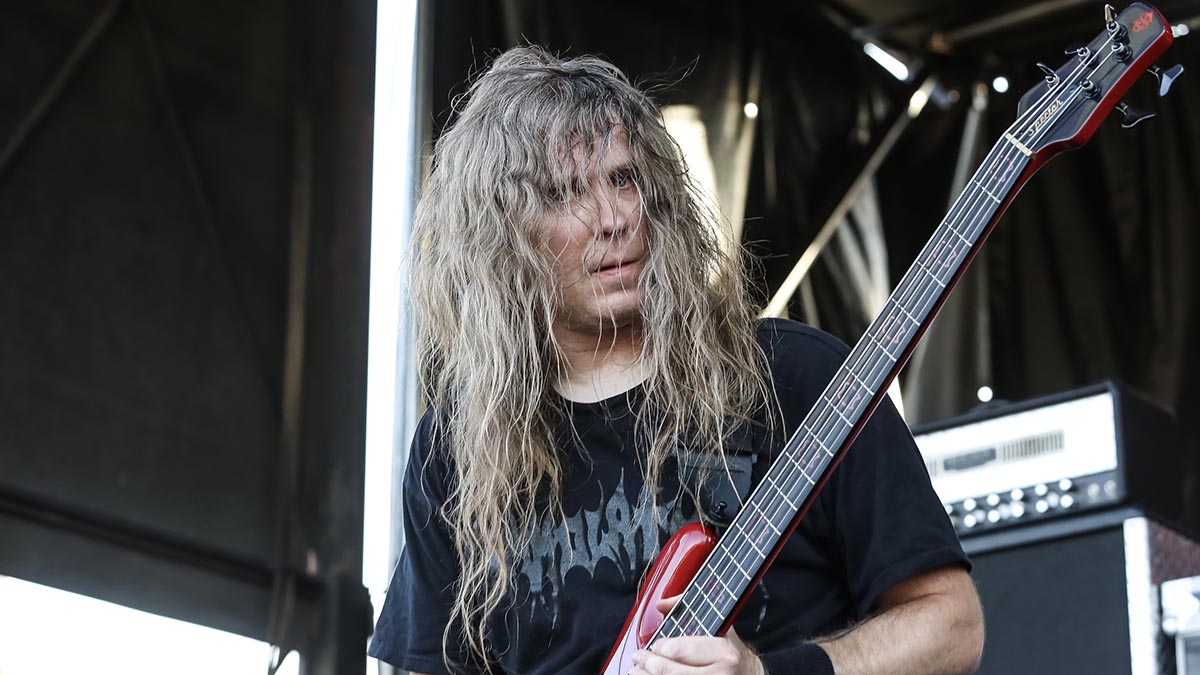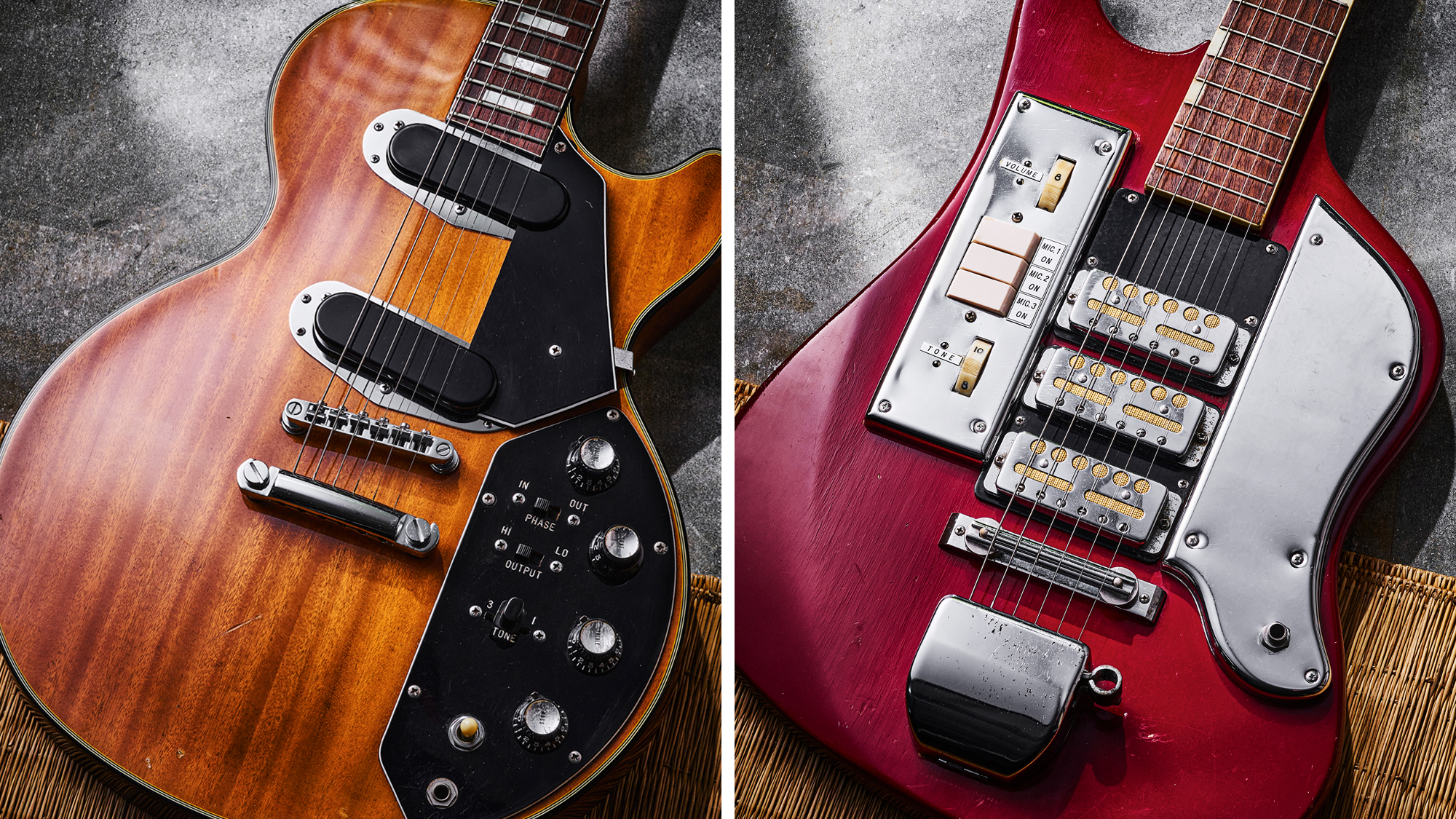Cannibal Corpse bassist Alex Webster on his 5 best bass albums
Death metal’s low-end master takes us on a bloody tour of the totally NSFW Cannibal catalog

Death metal devils Cannibal Corpse were formed in Buffalo, New York in 1988, and over three decades have produced 15 brutally aggressive but melodic albums.
Bassist and founder member Alex Webster has been there for the entire journey, from the early, live-sounding albums through the group’s development into the technically spectacular, experienced outfit that we hear today.
Webster’s galloping three-finger technique unlocks speed and accuracy that other bassists can only dream of; remarkably, he achieves great attack and clarity without the need for a pick.
These days, he wields his signature Spector bass guitars, having also played Fender, Modulus and Ibanez basses over the years. As well as being an intensely talented player, Webster was also given the ultimate accolade a while back when paleontologists named a fossil ringworm after him – a toothy monster called Websteroprion Armstrongi.
This month, Webster talks us through five key moments from his ongoing career. Unlike the aforementioned worm, he is no fossil – and shows no signs of slowing down as a player, songwriter, and metal force. If anything, he’s eager to achieve an even faster pace...
1. Cannibal Corpse – Violence Unimagined (2021)
“We recorded this in April and May 2020, and of course we all know what was going on in the world at that time. I live in Oregon, on the West Coast of the United States, and the rest of the guys are down in Florida.
“Normally that’s not a problem, but with the pandemic, travel restrictions and not knowing what was safe it became difficult. I did go down and jam with the guys that March on the new material, but by April it was clear that I couldn’t go there again.
Get The Pick Newsletter
All the latest guitar news, interviews, lessons, reviews, deals and more, direct to your inbox!
“Cannibal has always been a band that records together in the same studio, so this was not the normal way to do it for us. Fortunately, I have a good home studio setup here, which these days means a great audio interface, a program like Pro Tools and some really good DI bass boxes.
“I think for bass guitar you can get great results wherever you record, as long as you get a good DI signal. I had a clean DI channel, plus a distorted Darkglass B7K. Erik Rutan [Cannibal Corpse guitarist] produced, and he reamped the bass through a 1971 Ampeg, and then a Darkglass Microtubes X7 pedal. I also like to use a program like Sibelius to tab out all of my bass parts.”
2. Cannibal Corpse – Eaten Back to Life (1990)
“I had done a couple of demos before this, but this was our first full-length album. All of us were pretty inexperienced when we recorded it. I wasn’t even aware that you could punch in to fix any mistakes, so pretty much everything you hear is what me and Paul Mazurkiewicz, the drummer, put to tape.
I guess there’s little things I’d consider mistakes on there, but that captures something: It gives them that live feel
“We’d been performing all the songs on Eaten live around the northeast of the US, which has not always been the case with subsequent albums, where we practice the songs but haven’t played them live before going into the studio. We were all in one big room, with my cab in an isolated chamber, but we all had headphones and little mixers for ourselves.
“These days we’d probably do drums first, then rhythm guitar, then bass, vocals, solos, and so on. Back then, we had a week and a half to finish the album, so me and Paul had to nail it all in two days. If you screwed something up, you just did the whole thing again.
“I guess there’s little things I’d consider mistakes on there, but that captures something: It gives them that live feel. I was playing my 1980s Japanese Fender Precision through a Gallien-Krueger head and an Ampeg SVT cab.”
3. Cannibal Corpse – The Bleeding (1994)
“Our fourth album is where we really came into our own and hit our stride. We were just as aggressive as the previous three albums, but we added more polish and professionalism. The word ‘polish’ is a terrible one in metal, but it really just means being a high-level, professional-sounding death metal band.
I feel that The Bleeding was a big step forward for me as a bass player
“I put a lot of stuff in there, too: It was the most bass guitar-intense album so far, and I’m pretty loud in the mix. All the songs have cool little bass things that jump out and go a little bit beyond what the guitar is doing in a particular section – for example, there’s a bunch of cool almost-solos on the bass in An Experiment In Homicide.
“There’s a fairly simple but prominent bass feature in the middle of Staring Through The Eyes Of The Dead which is different from the guitars and stands out nicely. Experience means a lot as a musician, and you learn over time.
“I feel that The Bleeding was a big step forward for me as a bass player, and as a band it put us on the same level as some of the other groups we thought were a little more professional-sounding than we were. We looked up to bands like Morbid Angel and Death.”
4. Cannibal Corpse – The Wretched Spawn (2004)
“We recorded this at Sonic Ranch, 40 minutes outside of El Paso, Texas. I was playing a Spector bass that I’d bought – previously I hired one for Vile [1996] and I had also been playing Modulus basses. This is an album with some of our most challenging material, and a lot of bass stuff going on.
Fast picking, low tunings, and double-kick drums all make the bass player’s job a touch more difficult, so having a good tone that cuts through is very important
“There’s some extremely complex playing on Frantic Disembowelment, which is technically very difficult to execute. There’s a lot of fast fingerwork and complex song structures, for example on Bent Backwards And Broken. I was really happy with my tone here, and though I play through Aguilar amps these days, I’ve used Ampeg more often in my career than anything else.
“On this album it was probably a SVT-4 Pro into a 8x10 cabinet: We were looking for something punchy, where you can hear the finger attack. I like it to be a tone that doesn’t jump out as being overdriven, but is loud, aggressive and clean.
“Fast picking, low tunings, and double-kick drums all make the bass player’s job a touch more difficult, so having a good tone that cuts through is very important – something just on the verge of going over the edge.”
5. Conquering Dystopia – Conquering Dystopia (2014)
“This was one of the albums where I built up some home recording experience – and which obviously paid off recently. The band is guitarists Keith Merrow and Jeff Loomis, plus Alex Rüdinger on drums and me on bass. Keith and Jeff are virtuoso guitar players and Alex is an amazing drummer, so there’s a whole lot of notes going on.
“The album was all written before I did the bass parts, so I looked at the guitar and drums and blended into them a bit. There might be bits where replicating the guitar parts would be difficult or impossible, or it just wouldn’t sound good, so I’d take some notes from the guitars and land on the kick or snare strikes.
“It can be overwhelming when you’re working with music that’s so fast and so dense. I wanted to support it and tie things together while the guitarists went off to different planets.
“I play fingerstyle, so with Keith and Jeff’s super-fast picking, I couldn’t get to their speed: even if I could play that fast, the notes wouldn’t be blooming. The bass is low, the strings are thick – and when the music is challenging, sometimes simplicity is the best thing.”
Bass Player is the world’s most comprehensive, trusted and insightful bass publication for passionate bassists and active musicians of all ages. Whatever your ability, BP has the interviews, reviews and lessons that will make you a better bass player. We go behind the scenes with bass manufacturers, ask a stellar crew of bass players for their advice, and bring you insights into pretty much every style of bass playing that exists, from reggae to jazz to metal and beyond. The gear we review ranges from the affordable to the upmarket and we maximise the opportunity to evolve our playing with the best teachers on the planet.











